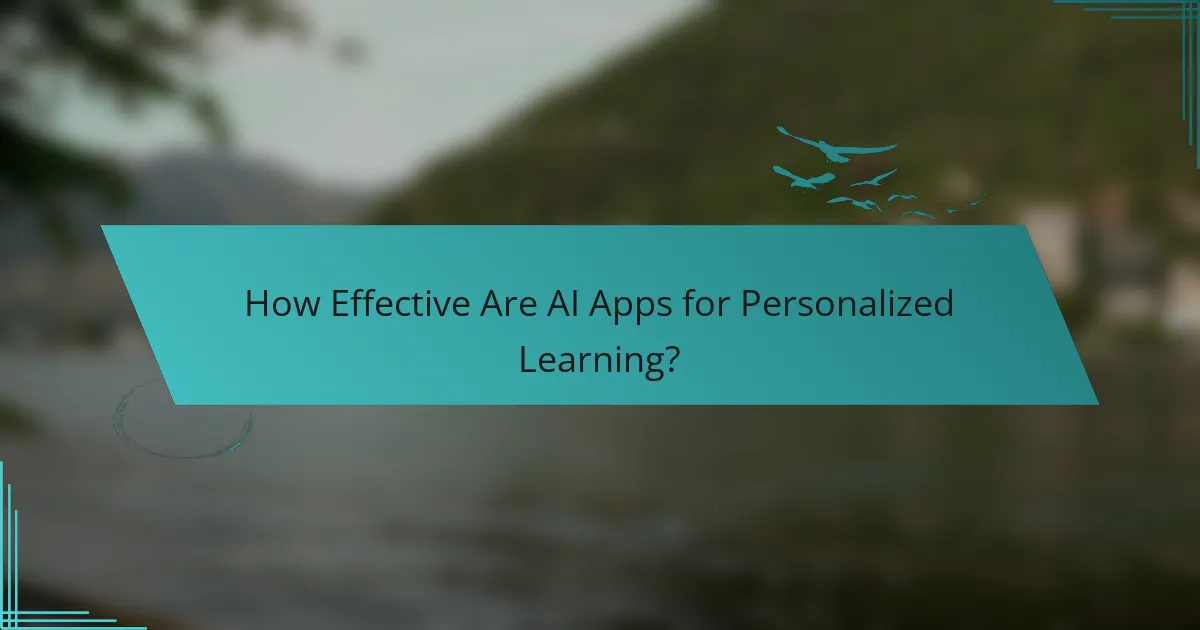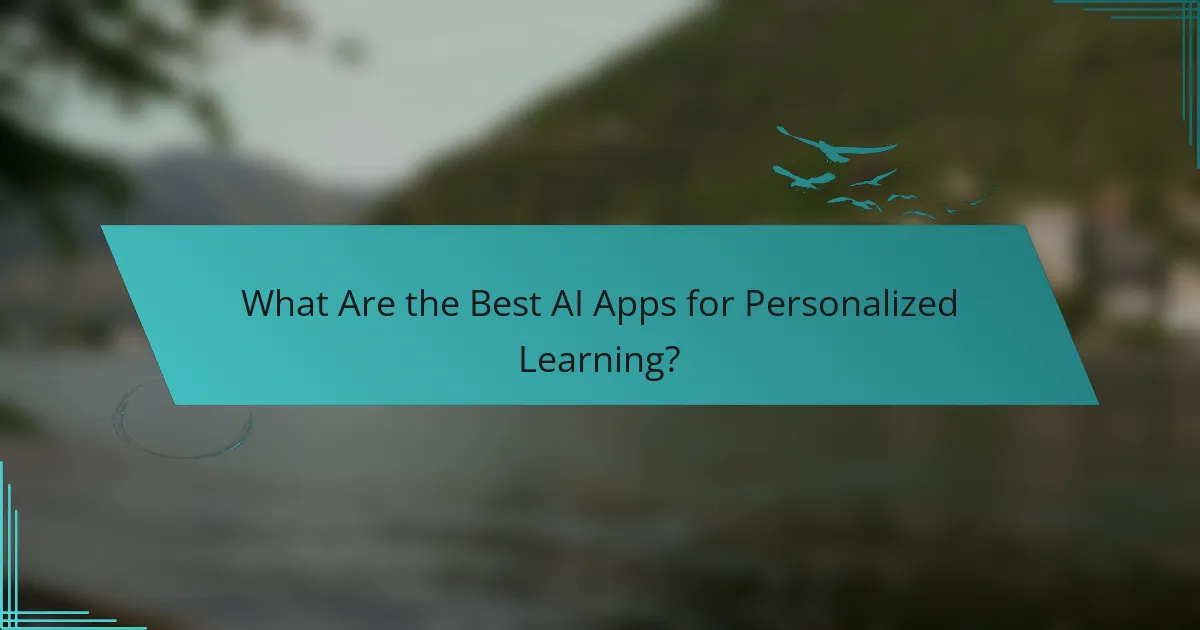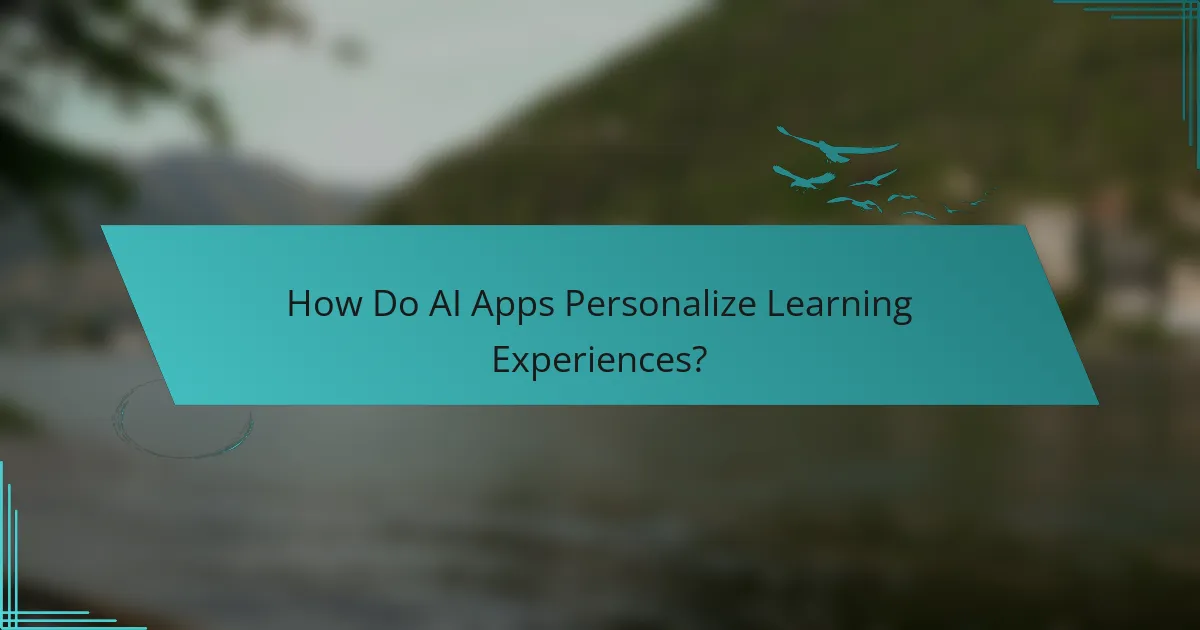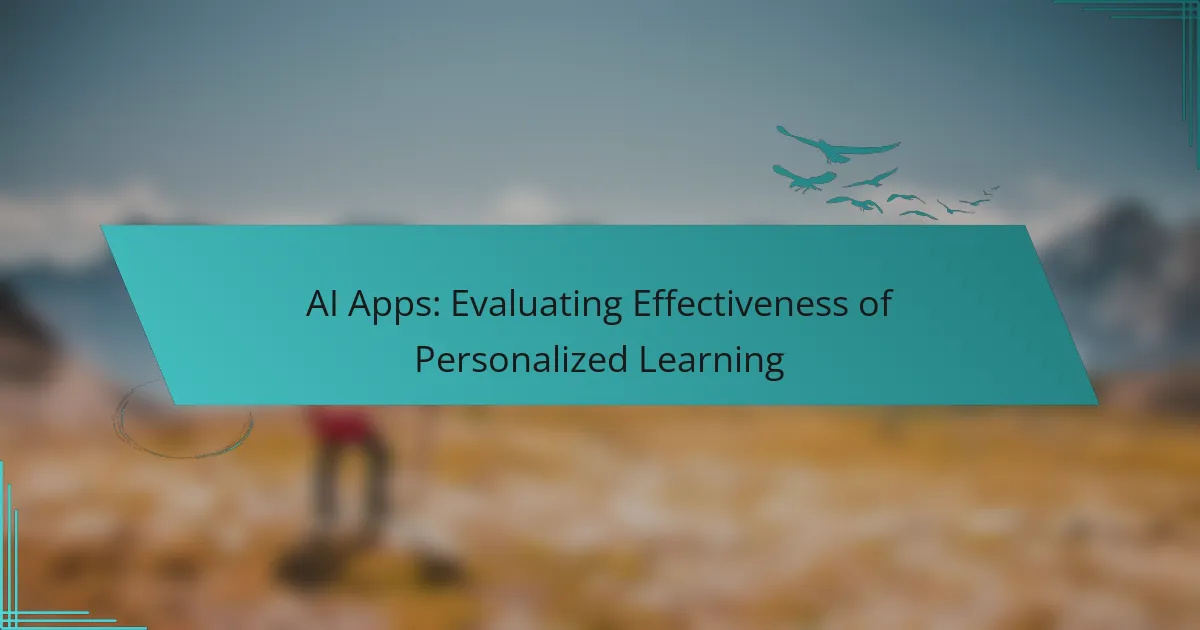AI applications for personalized learning are revolutionizing education by customizing content to fit individual student needs. Their success is largely determined by their ability to engage users, improve learning outcomes, and adapt to various learning styles, making them valuable tools in modern educational settings.

How Effective Are AI Apps for Personalized Learning?
AI apps for personalized learning can significantly enhance the educational experience by tailoring content to individual needs. Their effectiveness often hinges on how well they engage users, improve learning outcomes, and adapt to diverse learning paths.
Improved engagement metrics
AI applications can boost engagement by providing interactive and personalized content that resonates with learners. Features like gamification, instant feedback, and tailored challenges keep students motivated and invested in their learning journey.
For instance, platforms that track user progress and adapt challenges accordingly can lead to higher completion rates. Engaged learners are more likely to spend time on tasks, which can translate to better retention of information.
Enhanced learning outcomes
Personalized learning through AI can lead to improved academic performance by addressing individual strengths and weaknesses. By analyzing data on student interactions, AI can recommend resources that target specific areas for improvement.
Studies suggest that learners using AI-driven tools often see performance increases ranging from moderate to significant, depending on the subject and the quality of the app. For example, students struggling with math may benefit from targeted exercises that reinforce foundational concepts.
Adaptive learning pathways
AI apps create adaptive learning pathways that adjust in real-time based on student performance. This means that as learners progress, the app can modify the difficulty and type of content presented, ensuring that each student is challenged appropriately.
Such adaptability is crucial in diverse classrooms, where students may have varying levels of prior knowledge. By offering personalized pathways, AI can help all learners achieve their potential, making education more inclusive and effective.

What Are the Best AI Apps for Personalized Learning?
The best AI apps for personalized learning adapt educational content to meet individual needs, enhancing engagement and effectiveness. Popular options include Khan Academy, Duolingo, and Coursera, each offering unique features tailored to different learning styles and subjects.
Khan Academy
Khan Academy provides a comprehensive platform for personalized learning in subjects like math, science, and humanities. It uses adaptive technology to assess a learner’s progress and customize lessons accordingly, allowing users to work at their own pace.
Key features include instructional videos, practice exercises, and a personalized dashboard that tracks progress. Users can set goals and receive recommendations based on their performance, making it suitable for learners of all ages.
To maximize effectiveness, learners should regularly engage with the platform and utilize the practice exercises to reinforce concepts. Avoid skipping foundational topics, as they are crucial for understanding more advanced material.
Duolingo
Duolingo specializes in language learning through a gamified experience that adapts to the user’s skill level. The app employs AI to tailor lessons, ensuring that learners focus on areas where they need improvement while maintaining engagement through interactive exercises.
It offers a variety of languages and incorporates speaking, listening, reading, and writing exercises. Users can track their progress and receive daily reminders, which helps in building a consistent learning habit.
To get the most out of Duolingo, set daily goals and practice regularly. Avoid cramming; instead, aim for short, frequent sessions to enhance retention and fluency.
Coursera
Coursera partners with universities and organizations to offer a wide range of courses across various fields, including technology, business, and arts. The platform uses AI to recommend courses based on user interests and previous learning experiences, providing a personalized educational journey.
Courses often include video lectures, quizzes, and peer-reviewed assignments, allowing for a comprehensive learning experience. Many courses are free to audit, with the option to pay for certificates or specializations.
To effectively use Coursera, select courses that align with your career goals and interests. Engage with the community through forums and discussions, and set a study schedule to stay on track with deadlines and assignments.

How Do AI Apps Personalize Learning Experiences?
AI apps personalize learning experiences by analyzing individual user data to tailor educational content and strategies. This customization enhances engagement and effectiveness, allowing learners to progress at their own pace and according to their unique needs.
Data-driven insights
AI applications utilize data-driven insights to assess a learner’s strengths and weaknesses. By collecting information on user interactions, performance metrics, and learning habits, these apps can identify patterns that inform personalized learning paths.
For instance, if a student consistently struggles with math problems, the app may suggest targeted exercises or resources to address that specific area. This targeted approach can significantly improve learning outcomes over time.
Real-time feedback
Real-time feedback is a crucial feature of AI learning apps, providing immediate responses to user actions. This instant feedback helps learners understand their mistakes and correct them promptly, reinforcing concepts and improving retention.
For example, if a user answers a quiz question incorrectly, the app can instantly explain the correct answer and offer additional practice. This immediate reinforcement helps maintain engagement and encourages a growth mindset.
Customizable content
Customizable content allows learners to select topics, difficulty levels, and learning styles that suit their preferences. AI apps often provide options for adjusting the pace and complexity of lessons, ensuring that each user can engage with material that resonates with them.
For example, a language learning app might allow users to choose between vocabulary drills, conversational practice, or grammar exercises based on their interests and goals. This flexibility can lead to a more enjoyable and effective learning experience.

What Criteria Should Be Used to Evaluate AI Learning Apps?
To effectively evaluate AI learning apps, consider criteria such as user engagement, learning effectiveness, and scalability. These factors help determine how well an app meets the needs of learners and educators alike.
User engagement
User engagement is crucial for the success of AI learning apps. High engagement levels indicate that learners are actively participating and finding the content interesting. Look for features like interactive quizzes, gamification elements, and personalized feedback that encourage users to return regularly.
To assess engagement, track metrics such as session duration, frequency of use, and user retention rates. A well-designed app should aim for users to spend several minutes per session, ideally returning multiple times a week.
Learning effectiveness
Learning effectiveness measures how well an AI app helps users achieve their educational goals. This can be evaluated through assessments, progress tracking, and user feedback. An effective app should demonstrate improvements in knowledge retention and skill acquisition over time.
Consider using standardized assessments or pre-and post-tests to quantify learning gains. Aim for apps that show at least moderate improvements, typically in the range of 20-30%, in user performance after consistent use.
Scalability
Scalability refers to an app’s ability to accommodate a growing number of users without compromising performance. An effective AI learning app should maintain functionality and responsiveness as user numbers increase. This is particularly important for educational institutions that may have fluctuating enrollment.
Evaluate scalability by examining the app’s infrastructure and support for concurrent users. Look for cloud-based solutions that can handle thousands of users simultaneously while ensuring a smooth experience. Consider apps that have demonstrated successful scaling in real-world educational settings.

What Are the Challenges of Implementing AI in Education?
Implementing AI in education presents several challenges that can hinder its effectiveness. Key issues include data privacy concerns, integration with existing systems, and the cost of implementation, all of which require careful consideration to ensure successful adoption.
Data privacy concerns
Data privacy is a significant challenge when implementing AI in educational settings. Schools must ensure that student data is collected, stored, and used in compliance with regulations like FERPA in the U.S. or GDPR in Europe. This often involves obtaining consent from students and parents, which can complicate the deployment of AI tools.
Moreover, educational institutions must implement robust security measures to protect sensitive information from breaches. Regular audits and updates to privacy policies are essential to maintain trust with students and parents.
Integration with existing systems
Integrating AI applications with existing educational systems can be complex and time-consuming. Many schools rely on legacy systems that may not easily accommodate new technologies. Successful integration requires thorough planning and collaboration between IT staff, educators, and AI vendors.
To facilitate smoother integration, schools should assess their current infrastructure and identify potential compatibility issues. Utilizing APIs and middleware can help bridge gaps between systems, but this may also require additional training for staff to manage the transition effectively.
Cost of implementation
The cost of implementing AI in education can vary widely depending on the technology and scale of deployment. Initial expenses may include software licensing, hardware upgrades, and training for educators. Schools should budget for ongoing maintenance and support costs as well.
To manage costs, institutions can explore partnerships with tech companies or seek grants specifically aimed at educational technology. Additionally, piloting AI tools on a smaller scale can help assess their effectiveness before committing to larger investments.

How Can Educators Maximize the Benefits of AI Learning Apps?
Educators can maximize the benefits of AI learning apps by integrating them thoughtfully into their teaching strategies and aligning them with students’ individual learning needs. This involves selecting the right tools, providing guidance, and continuously assessing their effectiveness.
Choosing the Right AI Learning App
Selecting the appropriate AI learning app is crucial for maximizing its benefits. Educators should consider factors such as the app’s alignment with curriculum standards, user-friendliness, and the specific learning objectives it addresses. Researching reviews and seeking recommendations from other educators can also aid in making informed choices.
It’s beneficial to trial a few different apps to see which ones resonate best with students. Look for apps that offer personalized learning experiences and adapt to individual progress, as these can significantly enhance engagement and retention.
Integrating AI Apps into Lesson Plans
Integrating AI learning apps into lesson plans requires careful planning and consideration of how they complement traditional teaching methods. Educators should identify specific learning goals and determine how the app can support these objectives. For instance, using an app for practice exercises can reinforce concepts taught in class.
Incorporating AI tools during group activities or as part of homework assignments can also enhance collaborative learning. Ensure that students understand how to use the app effectively and provide them with clear instructions and support.
Monitoring Student Progress
Regularly monitoring student progress is essential to evaluate the effectiveness of AI learning apps. Educators should utilize built-in analytics provided by the apps to track individual and group performance. This data can help identify areas where students may need additional support or adjustment in their learning paths.
Setting up periodic check-ins with students to discuss their experiences with the app can provide valuable insights. Encourage students to share feedback on what they find helpful or challenging, which can inform future instructional decisions.
Providing Support and Feedback
Providing ongoing support and feedback is vital for maximizing the benefits of AI learning apps. Educators should be available to assist students with any technical issues and offer guidance on how to use the app effectively. Regular feedback on their progress can motivate students and help them stay engaged.
Encouraging a growth mindset by celebrating small achievements can enhance students’ confidence in using AI tools. Additionally, fostering an open dialogue about their experiences can lead to improvements in both the app’s use and the overall learning experience.
